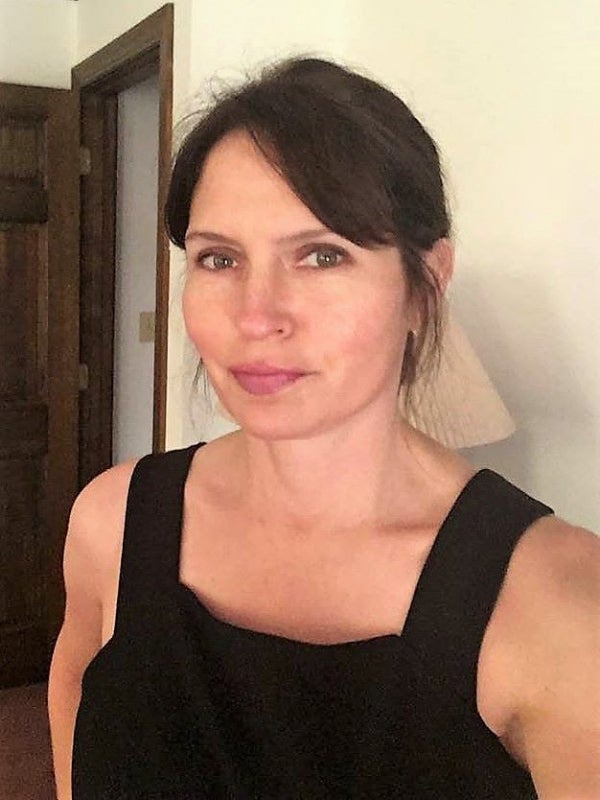From FNP Graduate to Clinical Preceptor: Creating a Safe Space for Patients and Students to Thrive
(September 16, 2022) — As a former theater instructor, Carrie Schaefer (G’17) knows how important trust is in the process of learning. “I used to teach acting and directing at the college level,” she says, “and building relationships and trust with one another helped give students the confidence they needed to do their best work onstage.”
Now, as a family nurse practitioner (FNP) who earned her Master of Science in Nursing degree through Georgetown’s distance-based, online program, Schaefer applies that same mindset to how she builds trust with the students she mentors and supervises at Central Virginia Health Services (CVHS), a community-based nonprofit organization in Fredericksburg, Virginia. For the past three years at CVHS, she has served as a preceptor for students as part of their required clinical field experience.

“I had pivoted from theater to a career in public health, where I was working primarily in HIV case management and coordinated care,” recalls Schaefer, reflecting on how her own journey began. “One day, an older colleague told me they were going back to school to get their master’s in nursing. I was in my early 40s at the time. ‘Why am I limiting myself because of my age?’ I wondered.” Schaefer says she applied to Georgetown the next day.
Fast forward a year into the program, and Schaefer was placed at CVHS for her clinical field work. “I connected deeply with what CVHS does and who they serve, so I applied for an FNP position here once I graduated,” she says. “I love what I do and can’t imagine working anywhere else — now as a preceptor, I want to give other students a safe place to explore and grow, just like what I had.”
So far, Schaefer has mentored nine Georgetown students at CVHS.
Real Patients, Real-World Hardships
CVHS is a Federally Qualified Health Center, with 19 mostly rural sites across Virginia serving diverse populations. “Our facility is a safety-net organization,” Schaefer explains, “meaning we see everyone, whether they’re insured or not, American citizens or undocumented immigrants, infants or the elderly. We serve patients from a variety of diverse backgrounds; most of them are from Latin American communities and primarily Spanish-speaking, while others are from Middle Eastern and Asian communities. We run the gamut of primary care services and try to get as much done for the patient as we can — biopsies, gynecological procedures, you name it — because so many people in our communities don’t have access to quality health care otherwise.”
In line with Georgetown’s mission, CVHS’s day-to-day environment offers students a critical perspective that many people fortunate enough to have health insurance may take for granted.
“Some patients need to be educated on simply how to fill a prescription,” Schaefer says. “Some have uncontrolled diabetes and have no idea how to change their diet. There’s also trauma: women who’ve walked on foot into the U.S. from El Salvador, been separated from their family, and perhaps experienced sexual violence along the way. I want to teach students in a supportive way how to address these very real situations — because regardless of where they end up, it’ll make them better medical professionals down the line.”
Learning to Face the Unknown
For Schaefer, creating that safety net of support means putting trust in her students right from the start.
“I bring students into all of my interactions,” Schaefer says. “They start by shadowing me, but pretty quickly they’re getting comfortable doing things like physical exams and Pap smears. We document everything. I observe them, ask them to communicate their diagnoses, and we build from there. It’s important they start establishing rapport with patients and figuring out how to talk to them, even when that requires an interpreter. They jump in and get going.”
Because she’s an alum, Schaefer has a clear understanding of where Georgetown students are in their learning process when they arrive at CVHS.
She also recognizes the uniqueness of working in a Federally Qualified Health Center offers. “These students are accessing a type of clinic they may never experience again,” she says. “But it’s important to know this model exists.”
Finally, she reinforces students’ ability to handle uncertainty. “Georgetown did a great job of teaching me how to process what I’m doing, yet also be OK with telling the patient, ‘I don’t know, but I’ll do some research and get back to you.’ Especially in primary care, students must understand they won’t have an answer every time. They need to become comfortable with the unknown, so that eventually they can go into a patient’s room without me, with no fear.”
The Value of Giving Back
Georgetown shapes students into medical professionals who are eager to interact with their communities in positive, direct ways. And that’s exactly the impact the program has had on Schaefer.
“Working at a safety-net clinic opens your eyes to the real world and makes you thankful for everything you have,” she says. “I want to show students how important it is to give some of that compassion to patients who’ve been ignored or mistreated their whole lives.”
For Schaefer, some of these patients include people recently out of jail or older individuals with health insurance for the first time. “They tell me, ‘You’re the first person who’s ever really made eye contact with me and asked me about my health,’” she says. “They’ve never had a checkup, and everything hurts, but I say, ‘I’ve got you — and I can’t wait to mold you into a healthy human being.’ I love helping people feel loved and respected. That’s what being a nurse practitioner is all about.”
by Deirdre Crovo
